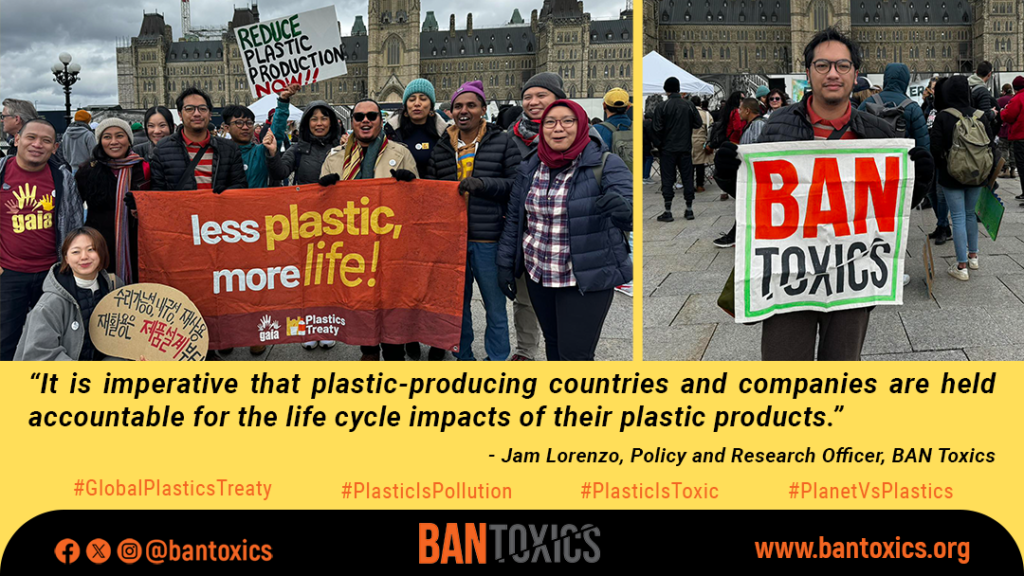
[BAN Toxics Position on the INC-4]
Before INC-4 negotiations officially start in Ottawa, Canada, BAN Toxics urges the Philippine government and global leaders to negotiate a Global Plastics Treaty that recognizes the plastic lifecycle’s contributions to the violation of health and environmental rights, and the disproportionate harm plastic production causes to vulnerable countries and communities.
Plastic pollution has surged in tandem with the expansion of plastic production, with single-use plastics comprising 50% of total production. Studies indicate that global production has soared from 1.7 million metric tonnes in 1950 to around 400 million metric tonnes (by polymer) in 2022, with projections suggesting it will double again in the next two decades. It affects all countries, whether rich or poor, albeit, differently.
It is widely recognized that pollution, extreme weather events and climate change are directly linked with the existing social determinants of human health, new health challenges, and impoverishing more people in poorer countries.
In recent years, the Philippines has been touted as one of the leading contributors to ocean plastic pollution. Moreover, the World Bank further reveals that the country has one of the highest rates of mismanaged plastic waste. While the country’s inadequate waste management capacity is often touted as the primary culprit, the narrative is misleading — this overlooks upstream sources of plastics before they reach consumers and the historically significant impacts of illicit waste trading from developed countries to countries such as the Philippines.
The results of the citizen science brand audit conducted by Break Free from Plastics (BFFP) in February 2024 across four Asian countries, including the Philippines, provide recent evidence that multinational fast-moving consumer goods corporations headquartered in the US, Europe, with a few in Asia, including one based in the Philippines, are the primary producers of problematic single-use plastic sachets.
The impact of plastic on human health, ecosystems, and climate begins with the extraction of fossil fuels, which are processed to produce monomers, the chemical building blocks of plastics.
Taking a full life cycle approach to understanding plastic pollution reveals that the biggest plastic polluters are the petrochemical industry, plastic, and large fast-moving consumer goods ( FMCG) manufacturers from developed countries. They have been allowed to operate with unrestrained production and profit in mind, often deflecting blame for the waste they produce onto consumers and shifting responsibility to governments.
The plastic industry is also the fastest-growing source of industrial greenhouse gases in the world, with the plastic life cycle being projected to account for up to 19% of global greenhouse emissions by 2040, rapidly diminishing the available carbon budget to keep global warming within sustainable planetary limits.
A groundbreaking study by Lawrence Berkeley National Laboratory and the Global Alliance for Incinerator Alternatives (GAIA) quantifies the substantial, deep production cuts required to remain within this budget. To align with the Paris Agreement and avert catastrophic global warming, the latest findings suggest that between 11.8 and 12.5% of plastic production must be annually cut starting in 2024. Any assessment of the climate impacts of plastic that exclude the upstream production stages misses the majority of greenhouse gas emissions.
It is imperative that plastic-producing countries and companies are held accountable for the lifecycle impacts of their plastic products. The responsibility and liability of corporations, often advocating a “pro-poor” stance on sachet affordability, must be enforced. Sachets come with hidden costs that are linked with plastic pollution and its impact on the environment, human health, food security, and people’s livelihoods.
Echoing the sentiments of numerous environmental and civil society groups worldwide, BAN Toxics asserts that the Global Plastics Treaty holds the potential to mitigate plastic pollution at its source. However, this can only be achieved if governments rise to the occasion and fulfill their responsibility to the people, environment, wildlife, and climate.
BAN Toxics, along with other civil society organizations, calls upon member-states to advance a global plastics treaty with the following key recommendations:
- To address the full lifecycle of plastic, prioritizing reduction in plastic production, starting with avoidable and hazardous plastics based on an essential use criteria approach.
- To end the transboundary movement of plastic waste and waste colonialism.
- To eliminate toxins across the lifecycle of plastics by chemical (including polymer) groups, including chemical additives, both intentionally and non-intentionally added substances (NIAS), and microplastics.
- To implement globally harmonized transparency, traceability, labeling, and disclosure systems for chemicals in plastics as well as the reporting of pollution through the pollutant release and transfer register.
- To scale up reuse and refill infrastructures that meet global minimum design criteria including standardized toxic-free packaging, safe collection and redistribution mechanisms and binding reuse targets.
- To reject technologies that do not address the root cause of plastic pollution, and instead worsen impacts on human health and the environment including chemical recycling, incineration, waste-to-energy, refuse-derived-fuel (RDF), and similar technologies.
- To prevent regrettable substitutes such as bio-based, biodegradable, and compostable plastics which have been shown to contain toxic chemicals and only divert attention away from the reduction of plastic production.
- To mandate polluter and producer accountability through globally harmonized standards for Extended Producer Responsibility (EPR) and a mechanism for the Polluter Pays Principle.
- To establish a dedicated financial mechanism (including provisions for polluter fees) through the creation of a global fund to support implementation for Parties to the treaty, alternative solutions, and harmonized transparency requirements.
- To protect and uphold human rights and social justice for all people impacted by plastic pollution, including workers across the plastic lifecycle, especially waste pickers, indigenous peoples & Global South communities, through Just Transition initiatives.
- To strengthen research and monitoring efforts on the impacts of plastic on human health and the environment, with an eye towards restoration, compensation, and remediation.
References:
https://www.no-burn.org/wp-content/uploads/2024/04/LBNL-plastic-policy-brief-EN.pdf
https://pubmed.ncbi.nlm.nih.gov/32892042
https://brandaudit.breakfreefromplastic.org/regional-reports/sachets-asia-2023
https://unfccc.int/news/a-new-plastics-economy-is-needed-to-protect-the-climate
https://plasticseurope.org/knowledge-hub/plastics-the-fast-facts-2023/
#LessPlasticMoreLife #GlobalPlasticsTreaty #PlasticIsToxic #PlanetVsPlastics #ZeroWasteSolutions #EndPlasticPollution #StopToxicPlastics #EndPlasticPoison #PeopleNotPlastics #PlasticsImpactsMe #PlasticFreeFuture #BreakFreeFromPlastics
